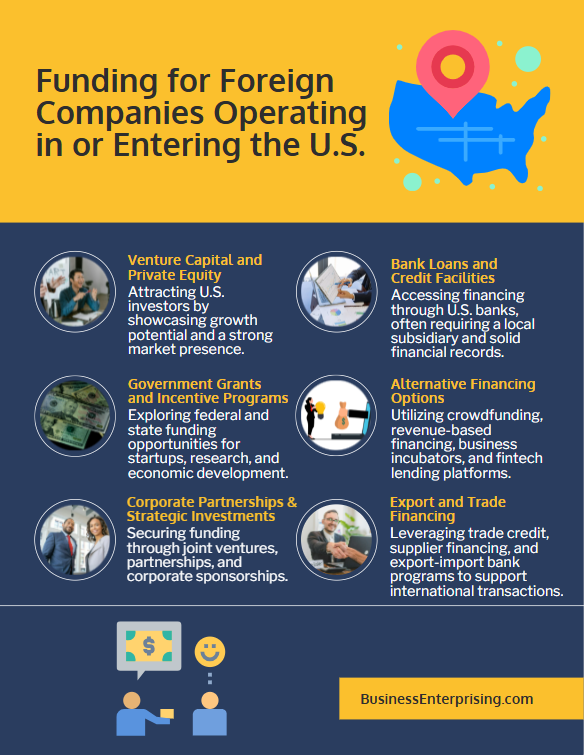 Expanding your business into the United States presents both opportunities and challenges. Understanding the various funding options for foreign companies is crucial to your success. The U.S. offers a diverse financial landscape, including traditional bank loans, venture capital, government grants, and alternative financing methods. However, navigating these options requires careful planning and awareness of specific requirements.
Expanding your business into the United States presents both opportunities and challenges. Understanding the various funding options for foreign companies is crucial to your success. The U.S. offers a diverse financial landscape, including traditional bank loans, venture capital, government grants, and alternative financing methods. However, navigating these options requires careful planning and awareness of specific requirements.
Traditional bank loans are a common choice for many businesses. U.S. banks may offer financing to foreign companies, but they often require a strong credit history and collateral. Establishing a U.S. subsidiary can facilitate this process, as it demonstrates a commitment to the local market. Additionally, maintaining transparent financial records and compliance with U.S. regulations can enhance your credibility with lenders.
Venture capital presents another avenue for funding. American investors often seek innovative companies with high growth potential. To attract venture capital, you should showcase a compelling business model and a clear plan for scalability. However, be prepared for rigorous due diligence processes and the possibility of relinquishing some control over your company.
Government grants and incentive programs are also available at both federal and state levels. These programs aim to stimulate economic development and innovation. For instance, the National Institutes of Health (NIH) offers grants for research projects, which are accessible to foreign organizations. However, eligibility criteria can be stringent, and the application process may be competitive.
Alternative financing options, such as crowdfunding and peer-to-peer lending, have gained popularity in recent years. These methods can provide more flexible terms and quicker access to capital. However, they often require a robust online presence and effective marketing strategies to reach potential investors.
Understanding U.S. Business Funding Landscape
Navigating the U.S. business funding landscape presents both opportunities and challenges for foreign companies. Understanding the available financing options and potential obstacles is crucial for success.
Foreign businesses can explore various funding avenues in the U.S. Traditional bank loans are accessible, but they often require a solid credit history and collateral. Venture capital firms may invest in foreign companies, especially those in high-growth sectors, though securing such funding is competitive. Government grants and programs, like those offered by the Export-Import Bank of the United States, provide financial assistance to international buyers of U.S. goods and services. Additionally, alternative financing methods, such as crowdfunding and peer-to-peer lending, have gained traction, offering more flexible terms.
However, foreign companies face significant challenges when seeking U.S. funding. Compliance with complex federal and state regulations can be daunting, requiring thorough research and often legal assistance. Establishing a U.S. subsidiary may simplify some processes but adds operational complexity. Cultural differences and unfamiliarity with the U.S. market can also hinder effective communication with potential investors. Moreover, intense competition from both domestic and international businesses means that standing out to financiers requires a compelling value proposition.
Venture Capital and Private Equity Investment
Attracting U.S. venture capital (VC) and private equity (PE) investment can significantly boost your company’s growth. To appeal to American investors, you should focus on several key strategies.
First, establish a strong local presence. Opening a U.S. office or partnering with domestic firms demonstrates your commitment to the market. This move can alleviate concerns about operational challenges and cultural differences. Additionally, aligning your business model with U.S. market demands showcases adaptability and readiness to compete.
Second, ensure transparent and compliant operations. Adhering to U.S. regulatory standards and maintaining clear financial records builds trust. Investors value companies that navigate legal requirements effectively, reducing perceived risks.
Third, highlight your unique value proposition. Demonstrating a competitive edge or innovative solution sets you apart. Emphasize how your product or service addresses specific U.S. market needs, making your company an attractive investment.
Understanding which sectors attract American venture capitalists can also guide your approach. Historically, industries like software, biotechnology, and media have garnered significant VC attention. More recently, artificial intelligence, green technologies, and healthcare have emerged as focal points for investors. Aligning your business with these high-interest areas can enhance your appeal.
To attract U.S. investors, establish a local presence, maintain transparency, and emphasize your unique value. Aligning with sectors that appeal to American venture capitalists further increases your chances. Among funding options for foreign companies, securing U.S. venture capital and private equity investment stands out as a viable path to expansion.
Bank Loans and Credit Facilities
Securing bank loans and credit facilities in the U.S. can be a viable funding option for foreign companies aiming to expand their operations. Several U.S. banks offer financing solutions tailored to international businesses. For example, Wells Fargo provides cross-border lending programs and supply chain finance to support global growth. Similarly, PNC Bank offers foreign currency loans to U.S. dollar-functional companies and their foreign subsidiaries, facilitating international transactions. Additionally, Intercredit Bank assists businesses in enhancing relationships with overseas suppliers through specialized loan programs.
However, obtaining financing requires meeting specific eligibility criteria and providing comprehensive documentation. Typically, banks expect the borrowing entity to operate as a registered business within the U.S. This often involves establishing a U.S. subsidiary or branch. Additionally, demonstrating significant operations and a majority of employees based in the United States can enhance eligibility. Lenders also assess the company’s creditworthiness, financial stability, and ability to repay the loan. Therefore, maintaining transparent financial records and compliance with U.S. regulations is essential.
In terms of documentation, banks generally require detailed financial statements, business plans, and proof of legal incorporation. They may also request information about the parent company’s financial health and global operations. Providing collateral or guarantees can strengthen the loan application. Moreover, understanding the specific requirements of each bank is crucial, as criteria can vary. Engaging with financial advisors familiar with U.S. banking practices can provide valuable guidance throughout the process.
While U.S. banks offer various funding options for foreign companies, meeting eligibility requirements and preparing thorough documentation are critical steps. Establishing a U.S. presence and demonstrating financial transparency can significantly improve the chances of securing the necessary financing to support your business endeavors.
Government Grants and Incentive Programs
Exploring government grants and incentive programs can provide valuable funding options for foreign companies seeking to establish or expand operations in the United States. Both federal and state-level opportunities exist, each with specific eligibility criteria and application processes.
At the federal level, agencies like the Economic Development Administration (EDA) offer grants aimed at stimulating economic growth. These grants support projects that create jobs and attract private investment. Similarly, the National Science Foundation’s Small Business Innovation Research (SBIR) and Small Business Technology Transfer (STTR) programs provide funding to startups engaged in research and development across various technology sectors. These programs encourage innovation and facilitate the commercialization of new technologies.
State governments also provide grants and incentives to attract foreign businesses. These may include cash grants, tax abatements, and utility rate reductions. Such incentives aim to reduce operational costs and encourage investment in local economies. However, eligibility requirements vary by state, so it’s essential to research specific programs that align with your business objectives.
For companies involved in scientific research, the National Institutes of Health (NIH) offers grants to foreign and international organizations for most research projects. While institutional training grants may not be available, research-focused funding can support innovative projects in health and medicine.
Navigating these funding options requires thorough preparation. Developing a comprehensive business plan, demonstrating potential economic impact, and aligning with the strategic goals of the funding agency can enhance your chances of securing grants. Engaging with local economic development organizations and utilizing resources like Grants.gov can also provide valuable guidance throughout the application process.
Alternative Financing Options
Exploring alternative financing options can provide foreign companies with diverse avenues to secure capital beyond traditional bank loans. Crowdfunding has emerged as a popular method, allowing businesses to raise funds from a large pool of individual investors via online platforms. This approach not only generates capital but also helps validate products or services in the market. However, it’s essential to craft a compelling campaign to attract potential backers.
Revenue-based financing offers another viable option. In this model, investors provide capital in exchange for a percentage of future revenues until a predetermined amount is repaid. This flexible arrangement aligns repayment with the company’s performance, easing cash flow management. It’s particularly beneficial for businesses with predictable revenue streams.
Business incubators can also play a crucial role in supporting foreign companies. These programs offer mentorship, resources, and sometimes funding to early-stage businesses. By participating, you can gain valuable industry connections and operational support, enhancing your chances of success in a new market.
Peer-to-peer (P2P) lending platforms have revolutionized access to capital by connecting borrowers directly with individual lenders. This method often results in more favorable terms compared to traditional banking. However, it’s important to note that interest rates can vary based on perceived risk. Additionally, fintech platforms have expanded the landscape of funding options for foreign companies. These platforms utilize technology to streamline the lending process, offering quick approvals and flexible terms. Engaging with reputable fintech providers can expedite your access to necessary funds.
Incorporating these alternative financing methods into your strategy can diversify your capital sources and potentially accelerate your business growth. It’s advisable to thoroughly research each option and consider consulting financial advisors to determine the best fit for your company’s specific needs.
Legal and Regulatory Considerations for Foreign Companies
Navigating the U.S. legal and regulatory environment is essential for foreign companies seeking to establish or expand operations. Understanding ownership laws and funding regulations is crucial for compliance.
Generally, U.S. federal law permits foreign investors to acquire majority or minority stakes in private corporations. However, certain sectors, such as aviation and telecommunications, impose specific restrictions. For instance, foreign ownership in U.S. air carriers is limited to 25% of voting interests. Additionally, the Committee on Foreign Investment in the United States (CFIUS) reviews foreign investments for national security implications, particularly in critical industries. Therefore, it’s advisable to assess whether your investment might trigger a CFIUS review.
Compliance with the Securities and Exchange Commission (SEC) regulations is vital when seeking funding options for foreign companies. If you plan to offer securities in the U.S., you must register with the SEC or qualify for an exemption. Foreign private issuers often use Form 20-F for registration and annual reporting. Moreover, the Foreign Corrupt Practices Act (FCPA) prohibits bribery of foreign officials, applying to all U.S. persons and certain foreign issuers. Adherence to FCPA provisions is non-negotiable to avoid severe penalties.
Banking laws also require careful attention. Foreign banking organizations operating in the U.S. must comply with regulations set forth by the Federal Reserve. These rules are tailored based on the size, complexity, and risk profile of the institution’s U.S. operations. Additionally, state laws may impose further restrictions on foreign ownership, particularly in sectors like agriculture and real estate. Therefore, a thorough review of both federal and state regulations is essential before proceeding.
Understanding and adhering to U.S. legal and regulatory requirements is fundamental for foreign companies. This diligence ensures compliance and facilitates successful business operations within the United States.
Conclusion
Expanding into the U.S. market requires careful financial planning. Understanding the available funding options and legal considerations helps foreign companies secure the capital needed for growth. Whether through venture capital, bank loans, government grants, or alternative financing, each option has benefits and challenges.
Traditional funding sources, such as bank loans and venture capital, often require strong financial records and a U.S. presence. However, alternative methods like crowdfunding and fintech lending offer flexibility for businesses without extensive credit histories. Exploring all financing channels can improve your chances of securing the right funding. Additionally, understanding U.S. regulatory requirements prevents compliance issues that could delay business operations.
Government incentives provide another opportunity to reduce costs. Federal and state-level programs offer grants, tax incentives, and business support to attract foreign investment. However, these programs often have strict eligibility criteria and application deadlines. Staying informed about available opportunities can help you take advantage of these resources.
Every business has unique funding needs. Assessing your financial goals, risk tolerance, and long-term strategy will help determine the most suitable financing approach. Engaging with financial and legal experts can also streamline the process. By considering various funding options for foreign companies, you can position your business for success in the U.S. market.



